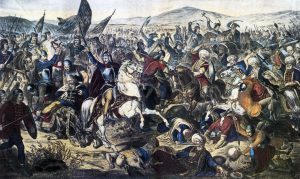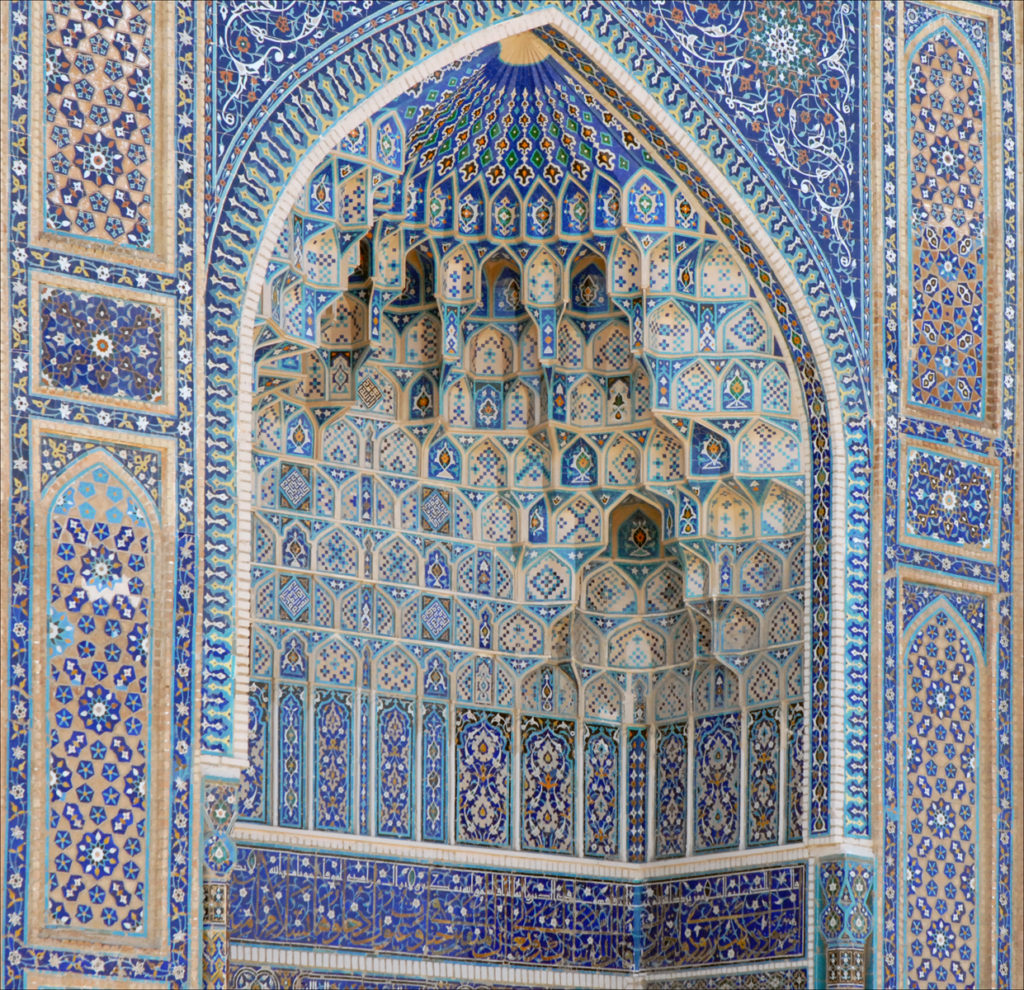
1390 AD to 1410 AD, Psalm 117: The Marranos.
This site was first built in French (see www.147thgeneration.net). The English translation was mainly done using « google translation ». We have tried to correct the result of this translation to avoid interpretation errors. However, it is likely that there are unsatisfactory translations, do not hesitate to communicate them to us for correction.
(for that click on this paragraph)
Summary
This generation of the 1390s and 1400s.
According to our count, this generation is the 117th generation associated with Psalm 117. It is in this Psalm 117 that we therefore find an illustration of the facts of this generation.
Constantinople which was created over a thousand years ago is struggling to survive Turkish pressure. Trying without real success to rally European aid, isolated Bizance should definitely have become an Ottoman in this generation. But the Ottomans were attacked by Tamerlane, a new Mongol invader, which delayed the conquest of Constantinople by nearly fifty years.
The Christian West is sinking into religious intolerance, Christian Spain (Aragon, Castile, Navarre and Portugal) was an exception to the rule, until this generation.
The economic crisis of the 1380s, sharpening social tensions, rekindled the growing hostility of the population against the Jews. The economic and social crisis, the rise of an anti-Jewish polemicist and a power vacuum caused by the death of John I, the advent of a minor, Henri III, in 1390, all these elements combine to create a context favorable to the outbreak of serious violence.
On June 4, 1391, the first massacres took place in Seville, and spread like wildfire throughout the Iberian Peninsula. Thousands of people are killed, and hundreds of Jewish neighborhoods burned down and attacked. Large numbers of Jews converted, under threat or of their own accord, in the prevailing atmosphere of crisis and terror. Many illustrious communities are hard hit; those of Toledo and Cordoba were devastated, and that of Barcelona disappeared forever.
Perhaps influenced by the Almohad adventure, where conversions to Islam were only temporary, the Jews of Spain are converting in large numbers to Christianity. Whether by real conviction, opportunism or to escape new discriminatory measures. These conversions will weigh heavily on the future of Jews in Spain.
Talk
Tamerlane
This generation is that of the 1490s and 1500s.
Constantinople which was created over a thousand years ago is struggling to survive the Turkish pressure, the death of John V in 1391 which ensured the longest reign in Byzantine history (1341-1391, a half century).
The Thessaloniki just falling into the hands of the Turks as well as Serbia (Battle of Kosovo in 1389), the former Byzantine empire almost reduced to Constantinople is ready to collapse and is de facto vassal Bajazet (Bayezid 1st), Sultan Ottoman (1389-1402). The new emperor Manuel II (1391-1425) tried to regain his independence from the Sultan by trying to rally to him the European Christian forces by privileging the confrontation with the Ottoman Sultan.
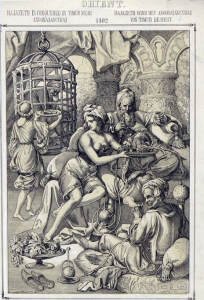
A decisive battle began in 1396. Constantinople was under Ottoman threat, Manuel II tried without any real success to rally to him the help of the Europeans, France and England among others. Byzantium, isolated, should definitely have become Ottoman to this generation but the Ottomans are under attack by Tamerlane, a new Mongol invader, which delays the conquest of Constantinople nearly fifty years.
It is unclear whether the Jewish communities in the territories captured by Tamerlane (particularly Syria, the Persian Empire and Baghdad) have suffered great damage as a result of the invasion. On the other hand Tamerlan’s desire for greatness for his city Samarkand (a major city in the Silk Road) gives birth to a new Jewish community (which would seem to indicate that Tamerlane spared the Jews).
The end of the Spanish exception
While at the extremities of Europe, in Asia and in the Middle East, a new world order with a clear separation between East and West is emerging for the future, the Christian West begins the purification of the last territories where a certain Religious coexistence is still possible then: Christian Spain.
At the same time France confirms its religious intolerance. Thus the Jews were expelled from France in 1394, « definitively » this time by King Charles VI, who had sunk into madness in 1392. However, this expulsion much less marked the Jewish collective memory because very few Jews s were resettled in France in 1359, when they (especially the richest) had been recalled again.
Thus, we are far from the situation of the Jews under the Carolingians or France of Rashi. The Christian West has closed to the Jews and only Christian Spain is an exception to the rule (Christian Spain is then composed of four kingdoms: Aragon, Castile, Navarre and Portugal). This was valid until this generation. The beginning of this generation marks the end of the Iberian exception.
- In the fourteenth century [1], the situation (for Jews in Christian Spain) continues to deteriorate. In 1320, the crusade of pastoureaux, part of France, causes in Aragon disorders with many attacks against the Jews.
- The King James II (1291-1327) finally put an end. The Black Death of 1348 is accompanied by anti-Jewish violence that threatens communities throughout the Iberian Peninsula. Although the authorities are strongly opposed to such explosions, they testify to the deep hostility that has been reinforced in previous decades. This period also sees the conversion of some prominent personalities. At the beginning of the 14th century, the Jewish physician and thinker Avner de Burgos (v. 1270-1340) was baptized and, under the name of Alphonse de Valladolid, he became an anti-Jewish polemicist. His works serve as a basis for many later attacks against Jews. The role played by apostates in the development of intolerance is a characteristic feature of Jewish life in 14th and 15th century Spain.
- Christian missionary zeal is associated with a beginning of erosion of Jewish community autonomy. Under the reign of John I (1379-1390), the Jews of Castile lost the ability to judge in criminal cases they enjoyed since the early days of the Reconquista. The same change occurs in Aragon in 1377. The aljamas (Jewish communities) themselves are going through a process of internal disintegration, with aggravated class conflicts, born of the friction between the masses and the strong oligarchy that holds power and maintains narrow relations with the circles of the courtiers. These conflicts have a devastating effect on both the morale of the Jewish group and the functioning of its community institutions.
- The economic crisis of the 1380s, sharpening social tensions, revived the growing hostility of the population against Jews. The accusations of profanation of hosts are more frequent. The archdeacon of Ecija, Ferrant Martinez, embarked on a fierce campaign against the Jews in 1378. When he became administrator of the archdiocese of Seville in 1390, all the conditions were ripe for the history of the Jews in Iberian soil to take a decisive turn.
The attack on Spanish Jewish communities
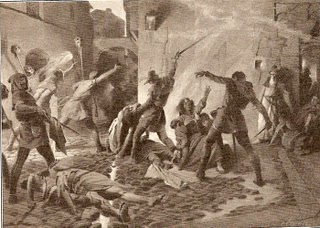
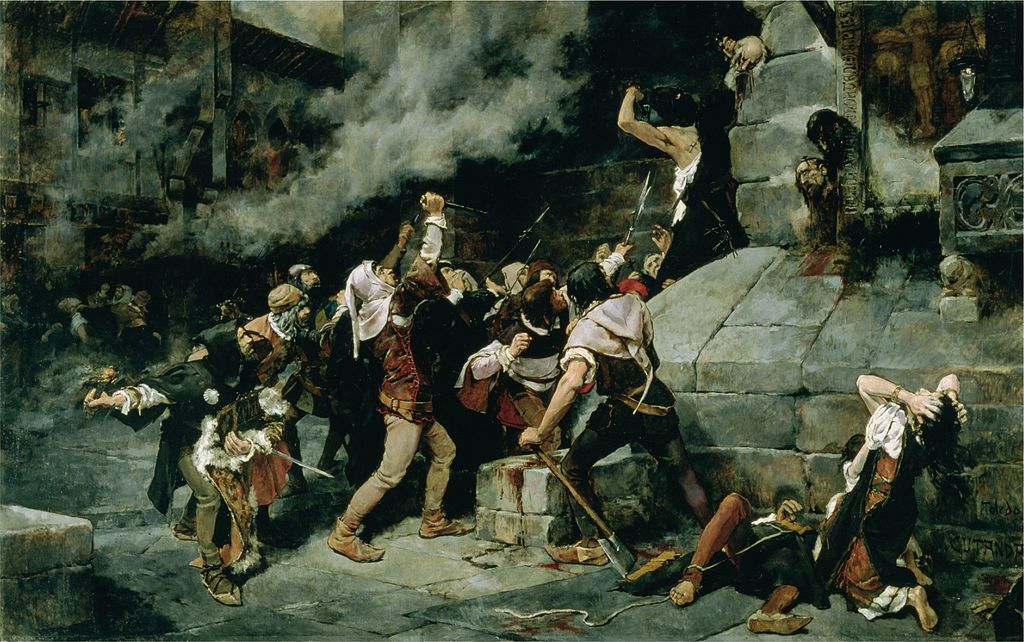
- The economic and social crisis, the rise of an anti-Jewish polemicist and a vacancy of power caused by the death of Jean 1st, the advent of a minor, Henry III, in 1390, all these elements combine to create a context favorable to the outbreak of serious violence. On June 4, 1391, the first massacres took place in Seville, and spread like wildfire throughout the Iberian Peninsula. Thousands of people are killed, and hundreds of Jewish neighborhoods burned and attacked. Large numbers of Jews are converted, under threat or of their own accord, into the atmosphere of crisis and terror that prevails. If there are some generous actions, here or there, on the part of the nobility or the royal army, in general, the traditional protectors of the Jews are ineffective. […]
- Many illustrious communities were badly affected; those of Toledo and Cordova were devastated, and that of Barcelona disappeared forever, when the riots gained Catalonia, in the north, from Valencia. Some of the leaders of the Jewish community, especially those who belonged to the highest ranks of society, were among the first to convert. For many, it was probably inconceivable to lose some high positions. Many others were forcibly baptized, and will only later be able to return to the faith of their fathers.
Of course again, this generation is marked by anti-Jewish riots and massacres, but that is not what the psalmist of this generation holds back. This does not mean that there is no compassion for the victims of this generation. These massacres that took place in 1391 are initialized in 1390 and are straddling two generations: this one and the previous one. However, in the previous generation, the psalmist anticipated these massacres:
(extract of the psalm 116 associated with the previous generation, verses 14 to 17)
- I shall pay my vows to the Lord now in the presence of all His people.
- Difficult in the eyes of the Lord is the death of His pious ones.
- Please, O Lord, for I am Your servant; I am Your servant the son of Your maidservant; You have loosed my thongs.
- To You I shall slaughter a thanksgiving offering, and I shall call out in the name of the Lord.
These verses stated in the future (since they announce the events of this generation) in their expression apply well to the Jews of the Communities of Spain who died in the events of 1391.
The Marranos
However, they do not mention the conversions to Christianity that occur during these events. There are two types of conversion: strength conversions and voluntary conversions. Presumably, those who converted by force to avoid death could return to Judaism later. Remains those who have seized the opportunity of these events to escape an announced destiny pariah within a Christian Spain in full change. Those who thought that by becoming Christians, sincere or not, they would manage to join the Spanish elite without their strongly rejected Jewish origin being an obstacle to their integration. While waiting for the story to give them wrong, their success seems real.
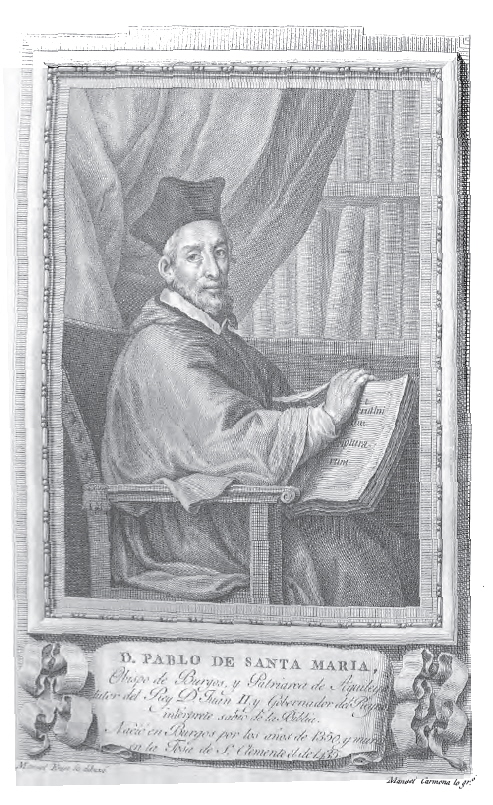
Pablo de Santa Maria [3] as his son, as well as many other converts will become bishop after his conversion. As a wise man [4] ; he chooses the name of Paul (Pablo), in remembrance of the apostle, and the name of Santa Maria, to better claim a resplendent kinship, because as a member of the tribe of Levi, he claimed to be of the same stock as the Blessed Virgin. He made a masterly and long career, […] his tomb became a place of pilgrimage (for Christians).
The voluntary or opportunistic conversion of such elites of Spanish Judaism does not fail to sow some confusion within the Jewish community. This is the case of Joshua ha-Lorki, who in an open letter to Ha-Levi (Pablo de Santa Maria) tries to understand the decision of his former master.
This generation marks the real beginning of a phenomenon of magnitude in the largest Jewish community in Europe at the time, the Sephardic community, the Jewish community of the Iberian Peninsula.
Perhaps influenced by the Almohad adventure, where conversions to Islam had only been temporary, the Jews of Spain converted to mass Christianity, whether by real conviction, opportunism or to escape the news discriminatory measures.
These new Christians, who will be called Marranos, name that is supposed to refer to the term « pig » (Spanish « marrano », but it can also come from the Arabic « mahram »: illicit). In fact most of them remained attached to Judaism for many decades, which will bring the drama of 1492. Of course the psalmist would have preferred that these Jews remain strong in their faith, as indicated in the previous psalm and even if it would have could result in death. But he refuses to judge those who in this generation have preferred to switch to the Christian religion to save their lives or those of theirs, or simply to have a better life.
This is why the psalm of this generation is particularly short: it is since the exile, the first time that the Jews really lose their marks.
Even during the many massacres in Europe that accompanied the Crusades or the plague epidemic, Jews have always preferred death to the renunciation of their faith.
It is therefore to these Jews who, despite the conversion, have chosen to keep their faith in the nations that the psalmist addresses this psalm. He asks them to keep their fidelity to God despite their integration with the peoples and nations of the earth:

- Praise the Lord, all nations, laud Him, all peoples.
- For His kindness has overwhelmed us, and the truth of the Lord is eternal. Hallelujah!

[1] Esther Benbassa / Aron Rodrigue: « History of the Sephardic Jews ». Chapter: « The end of Sefarad? (Prologue) » (French: « Histoire des Juifs sépharades ». Chapitre : « La fin de Sefarad ? (Prologue) ». (p. 37 à 39) ).
[3] According to Esther Benbassa / Aron Rodrigue: « History of the Sephardic Jews ». (French: « Histoire des Juifs sépharades ». (p. 42) ).
[4] Léon Poliakov: « History of anti-Semitism: 1. The age of faith ». Chapter: « The Spain of the Three Religions » (French: « Histoire de l’antisémitisme : 1. L’âge de la foi ». Chapitre : « L’Espagne des trois religions » (p. 150) ).

